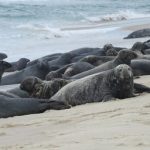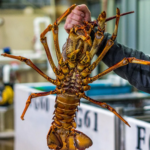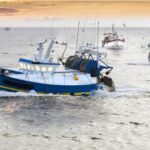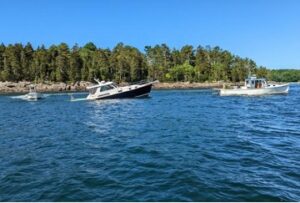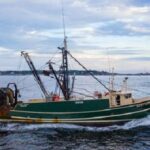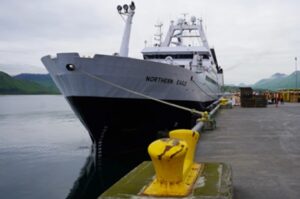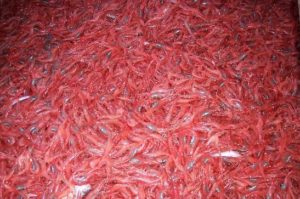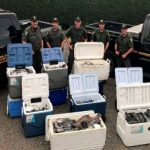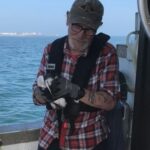Daily Archives: March 24, 2013
Written Testimony by Eric Schwaab, Assistant Administrator for the National Marine Fisheries Service on Developments and Opportunities in U.S….
Written Testimony by Eric Schwaab, Assistant Administrator for the National Marine Fisheries Service on Developments and Opportunities in U.S. Fisheries Management WASHINGTON, March 19 — The U.S. Department of Commerce’s ![]() National Oceanic and Atmospheric Administration released a copy of the following congressional testimony by Eric Schwaab, Assistant Administrator: Introduction Good morning, Mr. Chairman and Members of the Subcommittee. I appreciate the opportunity to speak with you today about interjurisdictional fisheries management. My name is Eric Schwaab continue reading
National Oceanic and Atmospheric Administration released a copy of the following congressional testimony by Eric Schwaab, Assistant Administrator: Introduction Good morning, Mr. Chairman and Members of the Subcommittee. I appreciate the opportunity to speak with you today about interjurisdictional fisheries management. My name is Eric Schwaab continue reading
Wabash River commercial fisherman arrested – harvesting shovelnose sturgeon from the Wabash River and selling the sturgeon eggs
![]() Illinois conservation police officers arrested Aaron Taylor, 34, at his home Thursday in Darwin, Ill., located on the Wabash River. The investigation revealed that Taylor had been harvesting shovelnose sturgeon from the Wabash River and selling the sturgeon eggs for several years. Taylor did not possess a valid Illinois roe harvester permit. Also in the boat was Larry L. Bryan, 66, also of Darwin, Ill. Bryan received several citations for boating violations and was released. continue reading
Illinois conservation police officers arrested Aaron Taylor, 34, at his home Thursday in Darwin, Ill., located on the Wabash River. The investigation revealed that Taylor had been harvesting shovelnose sturgeon from the Wabash River and selling the sturgeon eggs for several years. Taylor did not possess a valid Illinois roe harvester permit. Also in the boat was Larry L. Bryan, 66, also of Darwin, Ill. Bryan received several citations for boating violations and was released. continue reading
Hearings next month on eel fishery rules – Three Maine hearings will be held in April on proposed catch regulations.
 The proposed regulations are the result of a stock assessment that concluded the American eel population is technically depleted, likely due to a combination of overfishing, habitat loss, predation, environmental changes, disease, toxins and contaminants, food web alterations and turbine mortality. continue reading
The proposed regulations are the result of a stock assessment that concluded the American eel population is technically depleted, likely due to a combination of overfishing, habitat loss, predation, environmental changes, disease, toxins and contaminants, food web alterations and turbine mortality. continue reading
Biscayne Bay Shrimpers suggest a warm winter and after-effects of the 2010 oil spill in the Gulf are causes for this year’s dreadful season.
Steve Heintz says the food shrimp harvest season in Biscayne Bay that opened Nov. 1 has been the worst he’s seen in nearly 30 years of commercial fishing. “Last year was bad, but not anywhere near as bad as this year,” Heintz said i![]() n an interview earlier this month. “I’ve gone ten times and my biggest night was 250 pounds. It’s so bad that I’ll only go when I hear they caught some. Then, when I go, it’s already over.” continue reading
n an interview earlier this month. “I’ve gone ten times and my biggest night was 250 pounds. It’s so bad that I’ll only go when I hear they caught some. Then, when I go, it’s already over.” continue reading
Rhode Island Fishermen’s Alliance Weekly Update MARCH 24, 2013
 “The Rhode Island Fishermen’s Alliance is dedicated to its mission of continuing to help create sustainable fisheries without putting licensed fishermen out of business.” Read update here
“The Rhode Island Fishermen’s Alliance is dedicated to its mission of continuing to help create sustainable fisheries without putting licensed fishermen out of business.” Read update here
Forecast for Cape seals: Lots of gray
CHATHAM — On a recent fishing trip around Monomoy Island, Orleans fisherman Bill Amaru and his crew counted 4,000 gray seals that had hauled out on the island’s sandy beaches. While the experts still don’t know
![]() the exact number of gray seals in our waters, the latest stock assessment from the National Marine Fisheries Service estimated gray seals on the Cape and Islands at 15,756 in 2011 as compared with 5,611 in 1999. On one day in April 2011, researchers counted more than 10,000 seals hauled out on Monomoy alone. continue reading
the exact number of gray seals in our waters, the latest stock assessment from the National Marine Fisheries Service estimated gray seals on the Cape and Islands at 15,756 in 2011 as compared with 5,611 in 1999. On one day in April 2011, researchers counted more than 10,000 seals hauled out on Monomoy alone. continue reading
Bay Delta Conservation Plan will fail to restore the estuary by Dan Bacher
Tuesday, March 20 was a busy day for Restore the Delta (RTD), a coalition opposed to the Brown administration’s rush to construct massive peripheral tunnels to divert millions of acre-feet of water from the Sacramento-San Joaquin River Delta to corporate agribusiness, oil companies and Southern California developers. continue reading
Ocean salmon season looks bright; rainfall, river flows concerns for river season
 All signs are pointing to a great salmon ocean fishing year, a good follow-up to last year’s record salmon run. The Pacific Fishery Management Council is seeking public input on its preseason report, which lays out several options for the length of the season and other restrictions for fishing areas along the West Coast. continue reading
All signs are pointing to a great salmon ocean fishing year, a good follow-up to last year’s record salmon run. The Pacific Fishery Management Council is seeking public input on its preseason report, which lays out several options for the length of the season and other restrictions for fishing areas along the West Coast. continue reading
Puget Sound Herring, other forage fish, at risk
The survey for herring eggs in kelp beds continues throughout the herring spawning season, from February in most areas of Puget Sound through June for late-spawning stocks near Bellingham. What has caused the Cherry Point stock  to decline has not been determined, but researchers have raised questions about chemical contaminants, oil spills, parasites, disease, lack of prey or too many predators, as well as ongoing shoreline development. continue reading
to decline has not been determined, but researchers have raised questions about chemical contaminants, oil spills, parasites, disease, lack of prey or too many predators, as well as ongoing shoreline development. continue reading

































